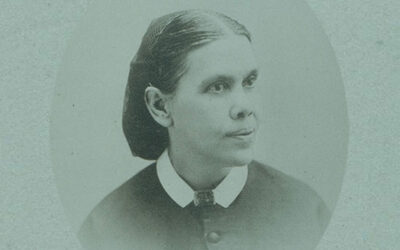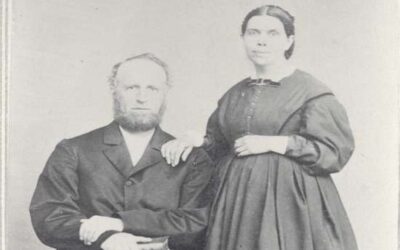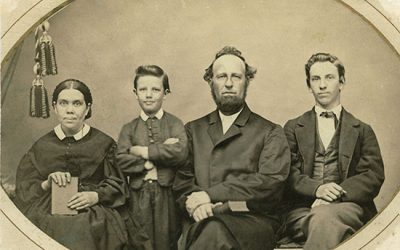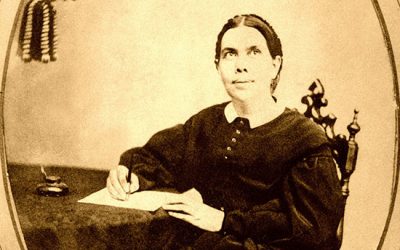At its core, music is a collection of tones, sounds, and rhythms that creates a melody. It’s also much more than that.
Like any form of art, it can be profoundly beautiful or deeply dreadful, exciting or depressing, happy or sad, chaotic or peaceful, etc.
And that’s why it’s so often been analyzed and discussed by scientists, philosophers, theologians, psychologists, neurologists…just to name a few.
Ellen G. White, one of the founders of the Seventh-day Adventist Church, also provided helpful guidance regarding music choices for Christians. She provided sound principles to answer questions the young Adventist Church had.
In this article, we’ll take a look at:
- Ellen White’s thoughts about music in general
- Specific qualities of music she addressed
- What kinds of music she refers to
- Takeaways we can apply to our own decision-making
Ellen White was a diligent student of God’s Word and aspired to apply its principles to all aspects of daily life. We’ll start by looking at the things she said about music in general.
Ellen White’s thoughts about music in general

Photo by Pavel Danilyuk from Pexels
Music, she believed, was a “precious gift of God.”1 It was something that could be inspiring and uplifting,2 an expressive and creative art form much like poetry or painting. She wrote, “Music was made to serve a holy purpose, to lift the thoughts to that which is pure, noble, and elevating, and to awaken in the soul devotion and gratitude to God.”3
Because music was originally a heavenly gift, it can also help in bringing people to Christ. “Song is one of the most effective means of impressing spiritual truth upon the heart. Often by the words of sacred song, the springs of penitence and faith have been unsealed,”4 she wrote. “God is glorified by songs of praise from a pure heart filled with love and devotion to Him.”5
Think about how it can be more difficult to remember the exact words of the best of sermons, but the words of a song often come to us with little effort.
Not only can it be moving to listen to a song, but singing one can be just as (or even more) inspiring. Ellen White saw that singing was also a gift from God—and like any of His gifts, it’s best used for His glory and to further His purposes.6
And even though Ellen White valued music and highly approved of it, she realized that, like many other things, it can become a negative influence when it’s used flippantly or when it stirs up unproductive emotions like anger or gluttony, or if it instills fear or encourages selfish behavior.
“Music, when not abused, is a great blessing,” she wrote.
But it would be naive to think that such a form of free and creative expression couldn’t also have a negative effect on us.7
She wrote the above words after observing that some forms of music had been distracting young Christians from God’s truth and taking their time and focus away from Him. These “frivolous songs” actually caused them to be more self-focused and became an “idol” for them, even as they professed to be devout Christians.8
And this might be hard to hear for those of us who dearly love music. For others it might cause alarm, or even a fearful regard toward any likable or engaging music. But we have to be careful not to default to extremes. So how can we determine when music is helpful and when it might be hurtful?
While Ellen White certainly doesn’t endorse or condemn any specific genre of music, she does talk about the different qualities of music that can make a difference in how it can affect us. And she encourages us to be aware of these things so we can make our own informed decisions.
Let’s take a look at the qualities of music she took the time to write about.
Specific qualities of music she addressed
Combined with her keen appreciation and observation of song, Ellen White was deeply in tune with the influence of the Holy Spirit. She made sure to keep her advice to fellow Adventists in line with biblical principles.
Volume
It’s not hard to notice how the volume of music can play an important role in the effect it’ll have on our minds (or our ears!). For those aspiring to sing, she advised them to prioritize singing clearly and distinctly before focusing on vocal projection (loudness).
“Let’s all take time to cultivate the voice, so that God’s praise can be sung in clear, soft tones, not with harshness and shrillness that offend the ear.”9
Along with this, Ellen White noted that loud singing does not mean it’s better. “…[N]oise is not music,” she admonished. Instead, she described “good singing” as “melodious,” like “the music of the birds.”10
But in saying this, she didn’t indicate that the loudness of music automatically made it bad or displeasing, either. Her point was that the decibel level wasn’t to be the first measure of quality, talent, or effectiveness.
Orderliness
It’s well-known that confusion and dissonance can stir up stress in our minds. This applies to music, too.
Orderliness and harmony in music is something Ellen White encouraged Christians to strive for. In Testimonies for the Church, vol. 1, she wrote, “God is not pleased with jargon and discord.” Instead, the more “harmonious singing” that is included in worship services, “the more is He glorified, the church benefited, and unbelievers favorably affected.”11
While there are musical expressions that include dissonance and resolution, the point here is that it’s best not to have the dissonance be the focus of the song. Order and harmony are parts of God’s ideal system. So when it comes to worship, it’s beautiful when a song can reflect some of the wonderful traits of His character.
Tone
Tone refers to the duration, intensity, pitch, and quality of a musical sound.
Ellen White would talk about tone because of how it can affect a song’s listeners. A favorable balance of tone could improve a song’s effectiveness on the audience. She noted that when songs are sung in a “natural tone,” and when words are “uttered clearly,” the experience can be deepened for both singers and listeners.12
So she advised singers to strive for a clear tone, rather than just thinking about the notes alone.
“The proper training of the voice is an important feature in education and should not be neglected.”13
In taking time to improve vocal tone, every note of a song can increase its effect on listeners.
(Plus, it not only makes a difference in singing or playing instruments. Tone of voice when speaking is also important.)
Usefulness

Photo by Keilah Gepte from Pexels
Music has many uses and benefits, aside from simply being enjoyable.
Songs can help us memorize things we need to know, and even help us keep the Word of God in our hearts—residing there for when we need it most.
Music can be used to praise God, showing that He is all about celebrating goodness and gladness, and it can help us bring depth to the words we express in adoration of Him.
It can also help us express complex or profound emotions and ideas, especially of eternal things that we long for through Jesus. Sometimes words seem to fall short when we’re expressing the love and glory of God, and music can help add to the full picture in ways we can’t always explain.
Ellen White specifically mentions music’s usefulness when she describes Moses leading the people of Israel in song as they traveled to Canaan. Singing helped them pass the time and occupy their minds with uplifting thoughts as they walked.14
She also saw that the Israelites put the Ten Commandments to a tune to help them remember them.15
When it comes to making music a part of our lives, she even made the case of how useful it can be for children to learn how to sing early on. “The value of song as a means of education should never be lost sight of. …Let there be singing in the school, and the pupils will be drawn closer to God, to their teachers, and to one another.”16
Singing at an early age not only can help in school, but later in life as well. A person in despair might remember an uplifting or calming tune they learned as a child. Someone else might use song to express some deep or complex emotions they’re feeling.
And to complement her general encouragement that music can be a wonderful addition to a child’s growth and development, there’s even been research that suggests how singing can improve lung health and cardiovascular function.17
Proper use and balance of instruments

Photo by Clem Onojeghuo on Unsplash
Ellen White didn’t only encourage singing, even though it tends to get much of the attention. She made a point to discuss the value that instruments added to a song.
“Call to your aid, if practicable, instrumental music, and let the glorious harmony ascend to God, an acceptable offering.”18
It’s also important to note that when she was writing, professionally designed instruments were not as common or diverse as what we have today. So they were a real treat.
She wrote that instruments were very useful in church services and evangelism. “And let the singing be accompanied with musical instruments skillfully handled. We are not to oppose the use of instrumental music in our work,” she advised.19 Instruments added another dimension to the harmony of voices that could create a beautiful song.
She also observed that instruments could help in expressing the message of a song, and it allowed more people to use their talents for God.
“These [instruments] were used in religious services in ancient times. The worshipers praised God upon the harp and cymbal, and music should have its place in our services. It will add to the interest.”20
However, balance is always something to be considered. Ellen White pointed out that if the sound of instruments becomes harsh, or too loud or chaotic, it can negate or hamper their positive effects.21
The use of instruments, while also considering tone, orderliness, and volume, can create an inspiring sound to draw people close to God in a way speaking can’t always match. It can be a wonderful thing to use instruments in ways that glorify God.
Looking at different uses and purposes of music
In her writings, Ellen White addressed the many different categories of music and how they are used.
Hymns and songs of worship

Photo by Aaron Burden on Unsplash
Since Ellen White so often wrote about things in a religious context, she would sometimes emphasize the use of music, like hymns and other sacred songs, in church services.
“As part of a religious service, singing is as much an act of worship as is prayer. Indeed, many a song is prayer,” she wrote in Education.22
As we saw earlier, she viewed music as an extremely powerful way to connect a person with God. So singing in church on Sabbath is not only beneficial to each person, but to the congregation as a whole.
Congregational singing was another element she emphasized. It’s better when church singing isn’t only done by a few people up front. As much as possible, the entire church should be encouraged to join in and experience the blessing of the singing.23
This doesn’t rule out a special music tribute, sung by one person or a duet by a couple people. These types of music are just as meaningful in their own way.
One characteristic religious music has is that it is deep, lasting worship. It is intended to bring your heart closer to God and impress His truth upon you.
Music in the Bible

Photo by Sara Budhwani on Unsplash
Ellen White recounts numerous kinds of music described in the Bible. For example, when the Israelites crossed the Red Sea and escaped the Egyptians, they sang a song of celebration to God. The words of this song are written in Exodus 15. She noted that they often sang this song as they journeyed toward Canaan.24
Along with this song, Ellen White says the Israelites sang the Ten Commandments. They were “chanted to the sound of instrumental music, the people keeping step as their voices united in praise.”25
The Israelites made use of the instruments they had available to them. When they were coming out of Egypt, the Bible records them using timbrels (Exodus 15:20), which are like tambourines. Later, as they settled into Canaan, more instruments became available to them. David played his harp for King Saul to calm his nerves (1 Samuel 16:16).
David also composed songs for his harp, many of which are recorded in the book of Psalms.
Ellen White noted in her book, The Desire of Ages, that Jesus often sang these Psalms and other heavenly songs.26 Many of the Psalms were written to be sung, also including directions to choir masters.
Even though music and singing in the Bible were usually viewed in a positive light, Ellen White does highlight an instance in which it can be used to manipulate or misrepresent. When Balaam coerced the Israelites to worship idols, she writes that music was a significant part of a plan to distract and entice the Israelites.
“He counseled Balak to proclaim an idolatrous feast in honor of their idol gods, and he would persuade the Israelites to attend, that they might be delighted with the music, and then the most beautiful Midianitish women should entice the Israelites to transgress the law of God, and corrupt themselves, and also influence them to offer sacrifice to idols.”27
But as we read, it’s easy to see that this isn’t talking about music in general. Lots of forms of art or expression have been used both to glorify God or to try to entice people toward other things. In that particular instance, Balaam intended to use music to add to an overall enticing effect. He wanted it to help draw in the Israelites, that they might attend this “idolatrous” gathering.
Music in heaven
Our singing won’t stop with our earthly lives. Song is so wonderful, we’re even told we’ll sing in heaven. Ellen White writes extensively about this.
“It [the rich, perfect music of heaven] cannot be described. It is melody, heavenly, divine, while from every countenance beams the image of Jesus, shining with glory unspeakable.”28
The Bible talks about this same singing. Revelation 5 describes a song that a heavenly choir of angels will sing, and Revelation 15:3-5 talks about our singing in heaven as well:
“They [followers of Christ] sing the song of Moses, the servant of God, and the song of the Lamb, saying:
‘Great and marvelous are Your works,
Lord God Almighty!
Just and true are Your ways,
O King of the saints!
Who shall not fear You, O Lord, and glorify Your name?
For You alone are holy.
For all nations shall come and worship before You,
For Your judgments have been manifested'” (NKJV).
If we think singing is delightful here, we’ll be blown away by the music in heaven!
Secular music
We use the term “secular” to mean that there isn’t a direct relation or reference to something holy or religious. Ellen White also talked about the qualities of music apart from its involvement in education or worship.
On one occasion, during her missionary service in Switzerland, she described hearing “most beautiful instrumental music” that was being played by a band in a public park—that was unfortunately also being used as a beer garden! While she decried that “almost every beautiful location of groves and gardens is converted into a beer garden,” she did enjoy the sounds of the music.29
She saw music in general as a gift from God. Even if it didn’t directly address or describe Him with specific lyrics, it could still be appreciated and enjoyed, drawing people toward the divine.
She also recognized that many songs not intended to praise God actually do praise things that are of God. They could be things like unconditional or sacrificial love, the beauty of nature, or getting along with others.
One cautionary thing she wrote about was the environment that a song is associated with. What does the song make you think of? What was the composer attempting to communicate or promote? Where is the song often played?
One kind of music Ellen White described with a tone of warning was “frivolous ditt[ies], fit for the dance hall.”30 And that’s because dance halls during her time were the forerunners of today’s nightclubs. The types of songs she was referring to “prepares the participants for unholy thought and action.”31
So even if the songs themselves, standing alone, may not have been “bad,” the point was that they were associated with drunkenness and sexually-suggestive dancing that often happened in these places.
The principle being emphasized was: It’s best for Christians to be cautious of listening to music that is crude or coarse, that promotes self-serving or hedonistic behavior, or that overtly glorifies humans above God. Essentially, any music that might hinder us from acting out of love at all times (1 John 4:8).
Emotional manipulation

Photo by Vishnu R Nair from Pexels
Ellen White also addressed music that was designed to persuade its listeners toward ultimately destructive behavior, to cause confusion, or to incite distrust or antagonistic attitudes.
Now, the whole purpose of music is to instill and draw upon human emotion and bring about more profound understanding—so having an emotional reaction to music is natural, expected, and encouraged. This very thing can even bring someone closer to Jesus by helping them open themselves up to deeper meanings and perspectives.
What Ellen White was referring to, however, was when that effect of music is exploited for harmful or unproductive purposes, like what Balaam did.
One rather dramatic example of this was the “Holy Flesh” movement. Ellen White specifically addressed this group and their behavior during a camp meeting in Indiana, calling out its manipulation of the senses. This movement encouraged people to shout and sing wildly until they had “the spirit,” causing them to fall to the ground.
The music, she said, was a “bedlam of noise”32 and it, along with the other theatrics, was not fit for a Christian evangelism effort.
What she warned against was the confusing and manipulative nature of the music, whatever it actually sounded like.
What’s more, someone experiencing the moving of the Holy Spirit doesn’t have to demonstrate this by reacting in a dramatic, alarming way that doesn’t provide anything helpful for those around them. That’s not what we find when we look through the Scriptures.
Takeaways from Ellen White’s insights on music

Photo by Tatiana Syrikova from Pexels
Here are some takeaways from Ellen White’s counsel on music and the power of song:
- It can help to sing while we work. Ellen White suggested in her book, Child Guidance, “Make your work pleasant by songs of praise.”33 Singing helps pass the time more enjoyably, and engages more of our brain and body than the work alone.
- Music is God’s gift. As Ellen White wrote, “The ability to sing is the gift of God; let it be used to His glory.”34 God is the creator, and He created us to be creative as well. He loves it when we create uplifting forms of art to enjoy, teach, emphasize, praise, etc.
- Music can encourage us. “Song is a weapon that we can always use against discouragement,” Ellen White wrote in The Ministry of Healing.35 Singing can not only distract us from discouragement, but it can inspire us to stay strong and persevere.
- Music is an expression of joy. “Let there be singing in the home, of songs that are sweet and pure, and there will be fewer words of censure and more of cheerfulness and hope and joy,” Ellen White wrote.36 Music is a form of expression, and it can help us share the joy we can find in God and the things He created.
- Music can be a form of prayer. Ellen White wrote that music can be a prayer to Jesus.37 This can help boost our prayer lives—not only by seeing prayer in a different light, but also praying in new way.
- Music helps us remember. Have you noticed it’s easier to remember something when you put the words to a tune? Ellen White wrote, “There are few means more effective for fixing His [Jesus’] words in the memory than repeating them in song.”38 This can be applied to anything from Bible verses to history dates to lists of qualities, traits, etc. You might be surprised at how much you can remember by singing!
Music is a powerful thing, which was God’s intention. That’s why it’s so fitting to use it to praise Him and recognize all the good things that come from Him.
It’s important to remember that most things that are powerful, enticing, stirring, etc., can also be used for negative or manipulative purposes.
But that doesn’t mean we have to treat all artistic or emotionally-stirring things as guilty until proven innocent. It means that we have to be conscientious about all our choices, including the music we listen to or share. That’s why Ellen White provided principles to help Christians make appropriate choices in the ways we enjoy and create artistic expression through music.
To learn more about the music that has historically been enjoyed in Adventist Churches throughout the denomination’s history, check out our page on the Adventist hymnal.
- White, Ellen G., Education, p. 167 [↵]
- White, Ellen G., Music–Its Role, Qualities, and Influence, p. 3 [↵]
- Ibid, p. 7 [↵]
- White, Ellen G., The Review and Herald, June 6, 1912. [↵]
- White, Ellen G., “Manuscript 134, 1901,” Letters and Manuscripts, vol. 16, par. 7 [↵]
- White, Ellen G., Testimonies for the Church, vol. 9, p. 144 [↵]
- White, Ellen G., Testimonies for the Church, vol. 1, p. 496 [↵]
- “Manuscript 134, 1091,” par. 5 [↵]
- Testimonies for the Church, vol. 9, p. 143-144 [↵]
- White, Ellen G., Evangelism, p. 510 [↵]
- White, Ellen G., Testimonies for the Church, Vol. 1, p. 146 [↵]
- White, Ellen G., Evangelism, p. 510 [↵]
- White, Ellen G., Patriarchs and Prophets, p. 591 [↵]
- Music—Its Role, Qualities, and Influence, p. 3 [↵]
- Evangelism, p. 499 [↵]
- Music–Its Role, Qualities, and Influence, p. 3 [↵]
- https://www.ncbi.nlm.nih.gov/pmc/articles/PMC5131649/ [↵]
- Music—Its Rule, Qualities, and Influence, p. 8 [↵]
- Testimonies for the Church, Vol. 9, p. 144 [↵]
- Evangelism, p. 500 [↵]
- White, Ellen G., Selected Messages, Book. 2, pp. 36-37 [↵]
- White, Ellen G., Education, p. 168 [↵]
- Evangelism, p. 507 [↵]
- Education, p. 39 [↵]
- Ibid. [↵]
- White, Ellen G., The Desire of Ages, pp. 73-74 [↵]
- White, Ellen G., Spiritual Gifts, Vol. 4, p. 49 [↵]
- Testimonies for the Church, vol. 1, p. 146 [↵]
- White, Ellen G., Manuscript 33, 1886 [↵]
- Testimonies for the Church, vol. 1, p. 585 [↵]
- White, Ellen G., Counsels to Parents, Teachers, and Students, p. 339 [↵]
- White, Ellen G., Selected Messages, Vol. 2, pp. 36-37 [↵]
- White, Ellen G., Child Guidance, p. 148 [↵]
- Testimonies for the Church, Vol. 9, p. 144 [↵]
- White, Ellen G., The Ministry of Healing, p. 234 [↵]
- Music—Its Role, Qualities, and Influence, p. 3 [↵]
- Education, p. 168 [↵]
- Education, p. 167 [↵]
More Answers
Ellen G. White’s Lasting Legacy
Ellen G. White is a well-known name among Seventh-day Adventists, but she also made an impact in many other parts of history, aside from being a co-founder of the Adventist Church.
Ellen G. White’s Challenging Health Journey
When it comes to lifelong struggles with health, Ellen White is no stranger. In fact, health challenges set the tone for her life early on—years before she was involved in co-founding the Seventh-day Adventist Church.
“What Was Ellen and James White’s Marriage Like?”
Ellen and James White, cofounders of the Seventh-day Adventist Church, met and married under somewhat unusual circumstances. But it’s a sweet story of partners in ministry becoming partners in life. And their married life continued to center on furthering the spread of the gospel together.
What is the Ellen G. White Estate?
What is the Ellen G. White Estate?Ellen G. White’s contributions to the formation and growth of the Seventh-day Adventist Church are an integral part of its history. As a significant co-founder of the denomination, her writings provided millions of people with...
How Can I Know Ellen White’s Messages Were From God?
It’s natural to be a bit skeptical when you hear about someone being “divinely inspired,” or that something is a “message from God,” etc. And we expect nothing different if you’re hearing about Ellen White, an influential co-founder of the Seventh-day Adventist Church, for the first time. After all, the Bible tells us that we’re supposed to test these things!
Ellen G. White’s Time in Australia
Ellen White traveled to Australia in the later part of her life, and she ended up spending nine years there. In that time, she helped the Australian Seventh-day Adventist Church increase in size and strength.
Ellen G. White’s Time in Europe
When the Seventh-day Adventist Church was still young, a council of the church in Europe requested Ellen White, one of Adventism’s key leaders, to come to Europe. Despite the many obstacles, God led her there to help the new churches and members for two years.
Ellen G. White’s Travels and Worldwide Mission
Though Ellen White, a co-founder of the Seventh-day Adventist Church, is best known for her ministry in the United States, she also traveled to twelve other countries in her lifetime—a big accomplishment in the 19th century when travel was strenuous and long.
Ellen G. White’s Counsel on College Education
Ellen G. (Harmon) White, a significant co-founder of Adventism, is often known for her practical and spiritual guidance for proper childhood education. But she was also significantly involved in the development of Seventh-day Adventist higher education.
8 Pieces of Advice from Ellen White’s Counsel for Families
In this article, we’ll look at the insight Ellen White received from God. We’ll cover 8 major themes she highlighted for families.
Was Everything Ellen White Said Divinely Inspired?
The Seventh-day Adventist Church believes that many of Ellen White’s messages were inspired by God. But that doesn’t mean everything she ever said was prophetic, or meant to be taken as direct instruction from God. So let’s break down how to identify the nature of her many written messages and quotes.
Who Were Ellen White’s Children?
Being the children of a woman with a prophetic calling from God had its blessings and its challenges.
In this overview, we’ll look at the highlights of the lives of Ellen White’s sons during her many years of ministry, as well as the ways each of them decided to serve Jesus Christ:
Ellen White’s Spiritual Counsel on Marriage
As one of the founders of the Seventh-day Adventist Church, Ellen G. White was held in high regard. She was a prolific author and was heavily engaged in the mission of the denomination, prayerfully pursuing the guidance of the Holy Spirit.
Ellen G. White or the Bible—Which is More Important to Adventists?
Ellen G. White or the Bible—Which is More Important to Adventists?The Bible—without a shadow of a doubt—is the most important book. It’s the standard we use to test all other writings, including those of Ellen White. The Seventh-day Adventist Church believes that “the...
Are Any of Ellen G. White’s Prophecies Yet to Come True?
Ellen White, a co-founder of the Seventh-day Adventist Church, demonstrated many times over that she had the spiritual gift of prophecy. Some of her predictions’ timelines have already passed, and those prophecies have been fulfilled. Others have yet to be fulfilled.
What Ellen White Said About Using the Bible in Education
Ellen White, one of the founders of the Seventh-day Adventist Church, believed that education was not complete unless it was founded upon the principles of the Bible.
But what does the Bible have to do with math or science? Is it important to integrate the Bible with schoolwork?
What Were Ellen White’s Visions About the Adventist Church?
What Were Ellen White’s Visions About the Adventist Church?Led by the Holy Spirit, Ellen G. White was given many messages, counsel, revelations, and visions about the Bible, history, prophecy, and how we can apply biblical principles to our daily lives. She was also a...
Was Ellen G. White Really a Prophet?
If you look at what Scripture provides as tests for a true prophet, Ellen White meets all the criteria.
What is the Spirit of Prophecy (Books 1–4) by Ellen G. White?
Applying biblical prophecy to history, recent events, and especially the future, can be a daunting task. Even a little scary for some. But even so, we can’t help but want to know more. We want to be prepared—to feel like we know how to weather the storm.
Ellen G. White’s Counsel on Christian Education
Ellen White, a co-founder of the Seventh-day Adventist Church, saw that the U.S. educational system during her time was lacking. And as part of her life of ministry, she sought out practical ways to be better stewards of our minds, bodies, and the lives we’re given.
What Does Ellen White Say About Prayer?
Have you ever had a burden you just had to tell someone, but you were afraid of being judged if you did? Ellen G. White, an important figure in the Seventh-day Adventist Church and a prolific writer, described prayer as talking to God in a personal way—He’s the friend we can tell everything to.
Were All Ellen White’s Visions About the Future?
While the visions God gave Ellen White were often about the distant future or last-day events, she had many others that addressed different topics. They may not be discussed as much as her visions about the Second Coming or the End Times, but they tackled some timely topics for her day.
What Did Ellen White Say About End-Time Prophecy?
We can read in Scripture about the series of events and signs that lead up to the second coming of Jesus Christ. And it sounds pretty intense, to say the least. The symbolic nature of the language of prophecy also can make things tricky to understand at first.
Were All Ellen White’s Books Inspired?
As the most translated female author in the world, Ellen White wrote numerous books, articles, pamphlets, and more. These writings focused on developing Christian character, emphasizing Bible truth, practical tips for living well and staying healthy, and discussing effective methods of delivering the gospel message to the world.
How Ellen White Influenced the Adventist Health Message
Seventh-day Adventists are known for their emphasis on healthy living. And Ellen G. White was a significant influence in the development of this priority and practice among Adventists.
What Did Ellen White Teach About Vegetarianism?
One thing you might have heard about Seventh-day Adventists is their emphasis on a vegetarian lifestyle. If you’re wondering why that is, it goes back to our church’s humble beginnings:
Steps to Christ: A Guide to a Relationship with Jesus
Whether you’re just starting your journey with Jesus Christ, are coming back after some time away, or have had a relationship with Jesus for years, using a book—in addition to the Bible—to guide or supplement that relationship can be helpful, comforting, and joyful.
Ellen White and Adventist Healthcare—Ahead of Their Time
Medical care in the mid-1800s was primitive, to say the least. Basic concepts we take for granted—such as proper handwashing or recognizing the dangers of bloodletting—were nonexistent. And doctors often had little more than nine months of training!
How Ellen White’s Teachings Can Improve Your Health
Healthcare in the nineteenth century was said to leave “more disease than it took away” with its use of bloodletting and “medicines” like mercury and arsenic. As people questioned these methods, new approaches popped up. But which ones were reliable?
Didn’t find your answer? Ask us!
We understand your concern of having questions but not knowing who to ask—we’ve felt it ourselves. When you’re ready to learn more about Adventists, send us a question! We know a thing or two about Adventists.





























